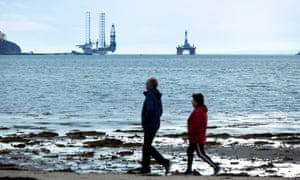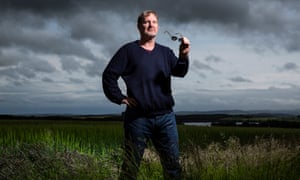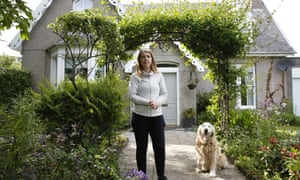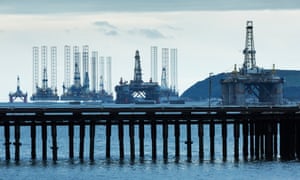
Like many young people in Aberdeen, Mike Scotland dreamed of a well-paid job on a rig in the North Sea, in the oil and gas field that has made his home town a boom town for most of the past 40 years.
In February the 28-year-old landed the position he had wanted with Shell, and he was due to take a helicopter to the Shearwater platform in July once he had completed training.
“I don’t think I have ever been as excited about anything in my life,” he recalled. “All I ever wanted was to land a health and safety role on a rig. I really wanted to make a difference.”
Then Covid-19 struck, oil prices crashed, new projects were cancelled and Scotland was laid off. He is now working as a team member at the KFC restaurant in the Haudagain retail park, where he earns the minimum wage.
“I earn in a week what I would have made in a day on the rig, but I can support my family and that is the main thing,” said Scotland, whose fiancee is expecting their second child in July. “I appreciate I have a job. Many don’t.”

Intergenerational divide
Since the start of the crisis, thousands of workers have been laid off in Aberdeen, which is the centre of the oil and gas industry in Europe. The town was already struggling to recover from a sharp fall in crude prices five years ago, as well as increasing social pressure to rein back on fossil fuels that are destabilising the climate.
The pandemic looks likely to accelerate the shift towards renewable energy, but while this raises hopes for a greener future, it also throws up huge concerns about intergenerational injustice. Without government intervention, the young look set to take a double hit from the post-lockdown economic downturn and the energy transition.
No age group is immune to the shift, but those closer to retirement are more likely to have a nest egg saved up from the golden era of North Sea oil.
Timothy Robinson, 62, a petroleum geologist, has decided to retire early as a result of the coronavirus downturn, which he believes is likely to choke the revival of the oil industry in Aberdeen
“I have almost 40 years of experience in energy and it is currently undergoing by far the most fundamental changes I have ever seen. The only growth areas I can see for it in Aberdeen are decommissioning old rigs and offshore wind energy,” he said. “I would advise anyone who [is] entering the industry to focus on developing experience and expertise in areas that are CO2-neutral, because that is the future.”

In terms of the economic fallout from Covid-19, Aberdeen is likely to be among the worst-affected cities in Britain. This is partly because it has so much to lose. The city has grown affluent thanks to its offshore expertise, which is in demand around the world. The population here are highly globalised, and many technicians and consultants fly off for several months of the year to do lucrative contract work on oil fields in Africa, South America or Asia.
But a Guardian callout to readers about the impact of coronavirus revealed a huge number of job losses that some say are barely covered in the media.
Nicola Gardiner, an Aberdeen resident whose husband works in the oil and gas industry, explained how her once-prosperous home city had been affected. Chatting on wicker chairs in the spacious garden outside her traditional granite house, she said house prices had slumped, people were stuck in negative equity and there were no jobs. Efforts to diversify the local economy by attracting more tourists have been hit by delays to the £350m harbour development. Restaurants and hotels are empty.
“It’s a domino effect here as ‘Aber-dream’ turns to ‘Aber-nightmare’,” she said. “There are bleak times ahead. That’s what happens when an industry is dying and a pandemic arrives.”

A just transition
On the seafront, seagulls circle noisily over roads and beaches that are considerably emptier than those along the coastline south of the border. A helicopter buzzes overhead, taking workers out to oil and gas platforms in the North Sea, but the number of such flights is far lower than six months ago.
Andrew Duncan (not his real name) used to be a frequent passenger because he specialises in maintenance of drilling equipment. Last week he was laid off after more than five years’ employment at a major oil service company.
He believes the Covid-19 crisis is being used by some firms as an excuse to accelerate restructuring plans. “I’m absolutely gutted. They went about it in an underhand, sneaky way,” he said. “I was treated as if I was just another asset, like a piece of equipment.”
He asked for his name to be changed because a public complaint could undermine his chances of getting a new job in the close-knit oil town, but he is seething at his experience.

He is worried about how he can provide for his wife and child. “This is just the beginning. The oil industry faces a perfect storm of lockdown, low prices and climate change,” he said.
Now he is applying for jobs in the wind turbine industry and oil rig decommissioning. “That is the future,” he said. He is encouraged by the Scottish government’s plans to support workers left adrift in the shift from fossil fuels to renewables. “If they could help me with training as a wind turbine technician, that would give me an extra chance.”
The Scottish government has gone further than the rest of the UK in preparing its economy and workforce for a shift to renewables. Rachel McEwen is part of the Just Transition commission, which has been advising the Scottish government on ways to shift from high-carbon to low-carbon industry with minimum social disruption. “The opportunities for injustice are endless. We must think where bad things will happen and get ahead of them,” she said.
She is also chief sustainability officer in one of Scotland’s leading companies, SSE, which last month announced a £3bn investment in a new windfarm off the Angus coast, just south of Aberdeen. The 1,075MW facility will be the country’s biggest ever privately funded project.
McEwen said the numbers would mean little unless there was a positive social impact. “Companies like us have pinned our whole being on finding profitable solutions to climate change. If that transition is unfair, you delegitimise it. So we have an interest in ensuring it is done in a thoughtful and just way.”

The potential for wind energy is evident at the Balmedie sand dunes, a short drive outside town. Gusts off the North Sea billow through the marram grass, allow kite-surfers to soar above the breakers and spin the giant turbine blades of a windfarm that sits a short distance away from the coastline. Locals joke that these giant structures were built as close as possible to the Trump golf course to infuriate the US president. But they are part of a broader trend. Aberdeenshire is said to be the largest windfarm in Europe in terms of the number of on- and offshore turbines. This is a major reason why wind is now the cheapest form of energy in the UK and has provided a substantial portion of our electricity during lockdown.
‘Expect the worst and hope for the best’
Colette Cohen, the chief executiveof the Oil and Gas Technology Centre in Aberdeen, is optimistic there will be more support for energy transition in Scotland.
“From industry perspective and from government connections, I would say the only recovery is a green recovery. A lot of people have seen a better world and want a change,” she said. “It’s very exciting. It’s an amazing time to be involved in energy and technology.”
Among the likely future developments are more offshore wind in the West Shetlands and the UK’s first hydrogen plant, which is expected within two years.
But she warned there was likely to be a dip for between 18 months to three years, as the investment shifted direction. “That is the difficult time. That’s the worry. It is hard to see how we will navigate that effectively.”
One element will be managing a generational shift: as boom-era oil workers retire and old rigs are decommissioned, opportunities for the young may be hard to find. Coronavirus has made that challenge even harder because it has shut down the service sector.

This week Scotland’s advisory group of economic recovery recommended that the government provide a two-year job lifeline and training scheme for young people as part of £6bn in stimulus spending. “If we don’t intervene radically to transform our economy, inequalities will drastically widen, with long-term scarring for communities across the country and for our young people in particular,” said the chair of the group, Benny Higgins.
It is a sensible step in keeping with Scotland’s more cautious – and successful – approach to dealing with the virus itself. The country, which continues with tighter lockdown restrictions than England, has fewer cases relative to its population and a faster falling rate of infections.
This prudent approach of acknowledging risk and alleviating adversity may explain why even the worst-affected workers find reasons for hope. Mike Scotland said he was throwing himself full-hearted into his new job at KFC, as well as continuing work on the mental health and environmental charities he founded.
“I get it when people say they are having a bad time, but that is not an excuse to give up. I am looking at this as a life lesson, a step outside my comfort zone,” he said. In the long run, he said, he believed his generation would get more opportunities because they were more familiar with technology and more open to new ideas than those who had come before them.
“I think there are a lot of people who want to change and are ready to change. But others who are not ready. I guess Covid could speed it up. People have had more time to be at home and to think,” he said. “We have to expect the worst and hope for the best.”
source https://www.theguardian.com/politics/2020/jun/25/britain-beyond-lockdown-can-we-become-cleaner-coronavirus



0 تعليقات